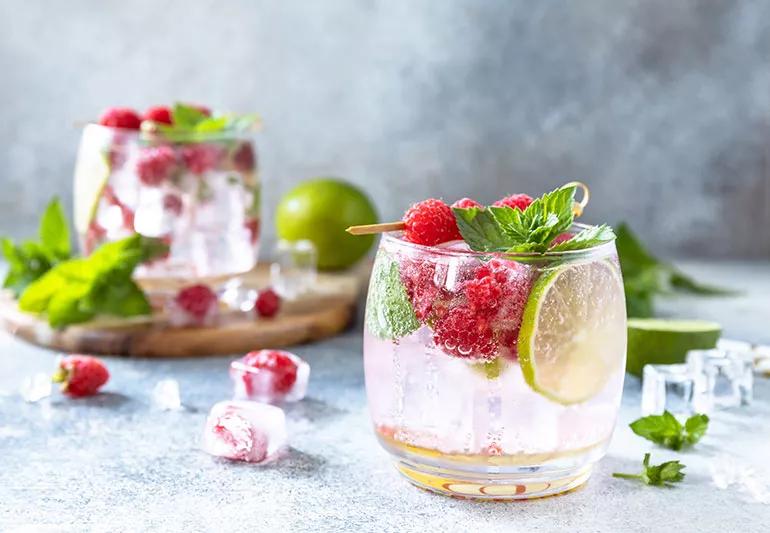Flavored seltzers can help you ease out of your love of soda

Image content: This image is available to view online.
View image online (https://assets.clevelandclinic.org/transform/4b07a128-f850-4d1c-b667-7cc0c9b70ed7/SparklingWaterl-1336355602-770x533-1_jpg)
Cold sparkling water with slices of lime, raspberries and mint are in two clear glasses.
Time to pop out the bubbly — water, that is! Sparkling water has become a popular alternative to soda, giving fun, fruity twists to your everyday hydration habits. But is it healthy?
Advertisement
Cleveland Clinic is a non-profit academic medical center. Advertising on our site helps support our mission. We do not endorse non-Cleveland Clinic products or services. Policy
Registered dietitian Lauren Sullivan, RD, weighs in on the health benefits of sparkling water, including which kinds are best and worst for you.
So you’ve swapped soda for seltzer, and now you’re concerned that you’ve simply traded one bad habit for another. Good news: As long as you’re drinking sparkling water with no added sugars, you’ve made an A+ choice.
In many cases, sparkling water is just water — which is, of course, vital to your health. That said, there are a few different kinds of sparkling water, and they’re not all created equally.
Advertisement
Feel free to crack open sugar-free seltzers and mineral waters to your heart’s delight — but limit tonic water. Not only does it include added sugars, but too much quinine can also cause an upset stomach, headaches, ringing in the ears, as well as other medically serious unpleasant side effects, like organ damage, severe bleeding and changes to your heart rhythm.
OK, so you know carbonated water is better for you than sugary soda, juice and energy drinks. But aside from sugar content, what, exactly, makes the bubbly so much better?
There’s one benefit so big it bears repeating: hydration, hydration, hydration. Sparkling water is just as hydrating as its bubble-free counterpart, so if you’re struggling to drink enough water during the day, there’s no harm in swapping a glass or two of still water for the fruity, fizzy stuff. Remember, though — no added sugars!
“Drinking sparkling water may lead to experiencing a short-term, immediate increase in satiety, or fullness,” Sullivan says. Some studies show that carbonated water keeps you feeling fuller for longer — and may even keep food in your stomach for longer than regular water.
In one study, people experiencing constipation after a stroke reported significant relief after two weeks of drinking sparkling water. Another study found that sparkling water brought relief to people with indigestion.
If you’re trying to kick a soda addiction or scale down on daily lattes, sparkling water could be the ticket to tricking your brain out of bad habits. You can even use herbs, fruit or cucumber to enhance the flavor of sparkling water.
“It can be difficult to transition from sweet drinks to water, but flavored seltzers and sparkling water can help,” Sullivan says. “Water, whether plain or carbonated, is better than high-calorie, sugar-infused drinks.”
As long as you’re choosing sugar-free, caffeine-free varieties, there aren’t many risks to worry about. “There is very little specific research showing that sparkling water has a negative impact on health,” Sullivan says. But there are a few things to watch out for.
You might experience temporary but unwanted side effects from sparkling water if you’re prone to tummy troubles:
If you find that your stomach doesn’t tolerate the carbonation well, scale back your sparkling water intake and stick to still water.
“Sparkling water may also contain minerals, whether natural or infused during the process of carbonation, that can lead to changes in your tooth enamel,” Sullivan warns. Be on the lookout for anything that includes citric acid, phosphorous or sugar, all of which can contribute to enamel erosion.
Advertisement
Regular seltzer, though, has not been shown to have a significant effect on enamel.
“Sparkling water may contain sugar, artificial sweeteners, caffeine and other additives,” Sullivan emphasizes, “but the best kind is the simple, straightforward kind, just water and carbonation.”
Sugar is associated with heart disease, diabetes, obesity and other chronic conditions; artificial sweeteners can cause stomach issues. And although caffeine is typically safe for healthy adults in limited amounts, there’s no safe level of caffeine intake for kids.
In other words, your sparkling water only qualifies as water if it’s not filled with other stuff. As long as you stick to the basics, feel free to drink your fill of the fizz.
Advertisement

Sign up for our Health Essentials emails for expert guidance on nutrition, fitness, sleep, skin care and more.
Learn more about our editorial process.
Advertisement
Consumption needs vary based on activity, weather, metabolism and other factors
A glass of lemon water in the morning can help with digestion and boost vitamin C levels, and may even help get you into a better routine
Mold and bacteria in your reusable water bottle can cause health issues like infections, respiratory issues and allergic reactions
Sitting in the dry heat may help reduce stress, improve heart health and relieve pain
Adding salt to your water isn’t going to have measurable benefits — but there may be plenty of downsides
Drinking untreated water can have dangerous consequences, like bacterial infections
Although it adds to your hydration, this water may be pushing you over the limit of the daily recommended dosage of caffeine
If you’re trying to drink less soda or fewer sugary drinks, flavored water can be a delicious and healthy alternative
Although it could be used as a moisturizer, this new trend is not recommended
Communicating clear limits helps protect your time, energy and emotional well-being
High cholesterol can be genetic, but testing and treatment can lower your heart disease risk